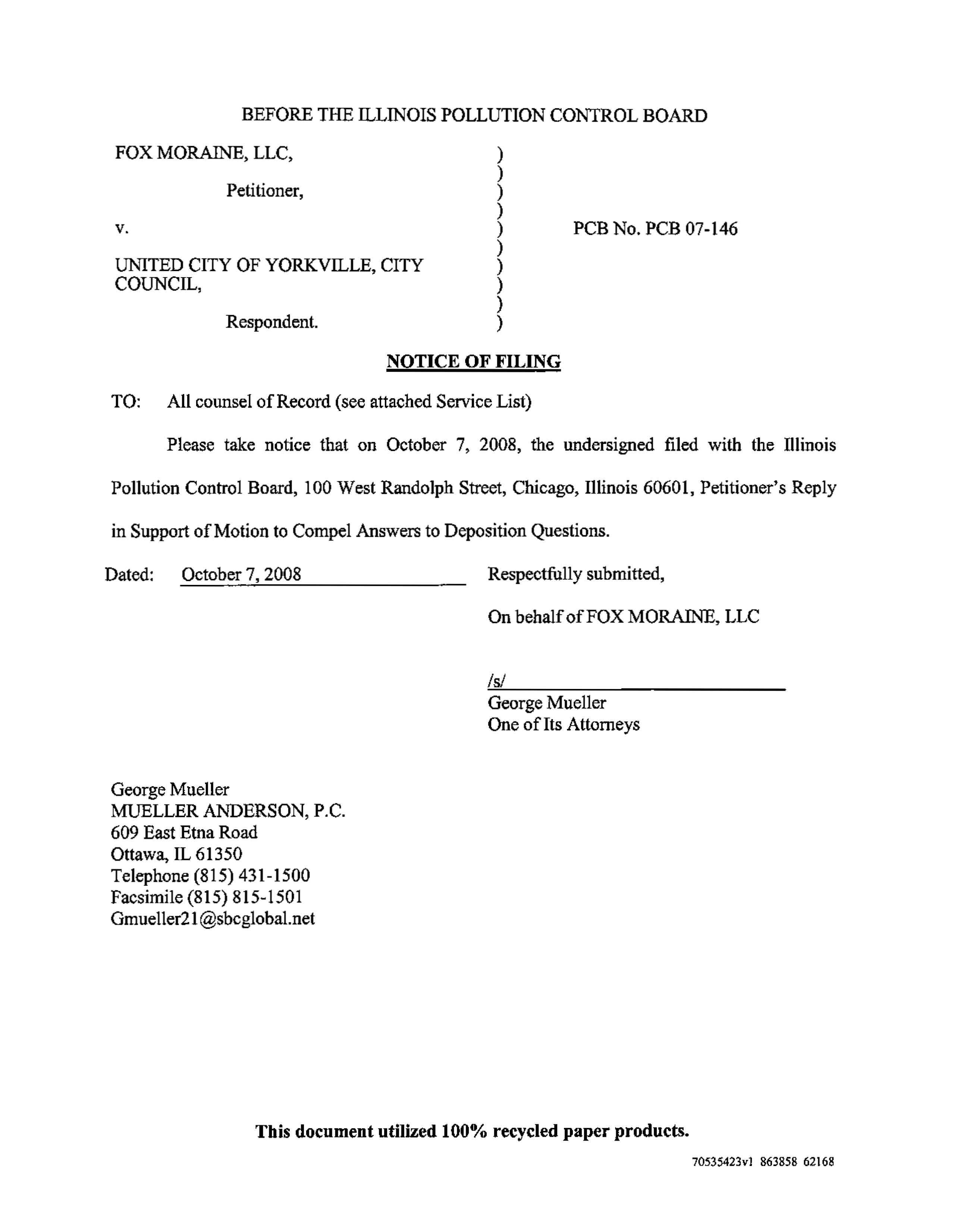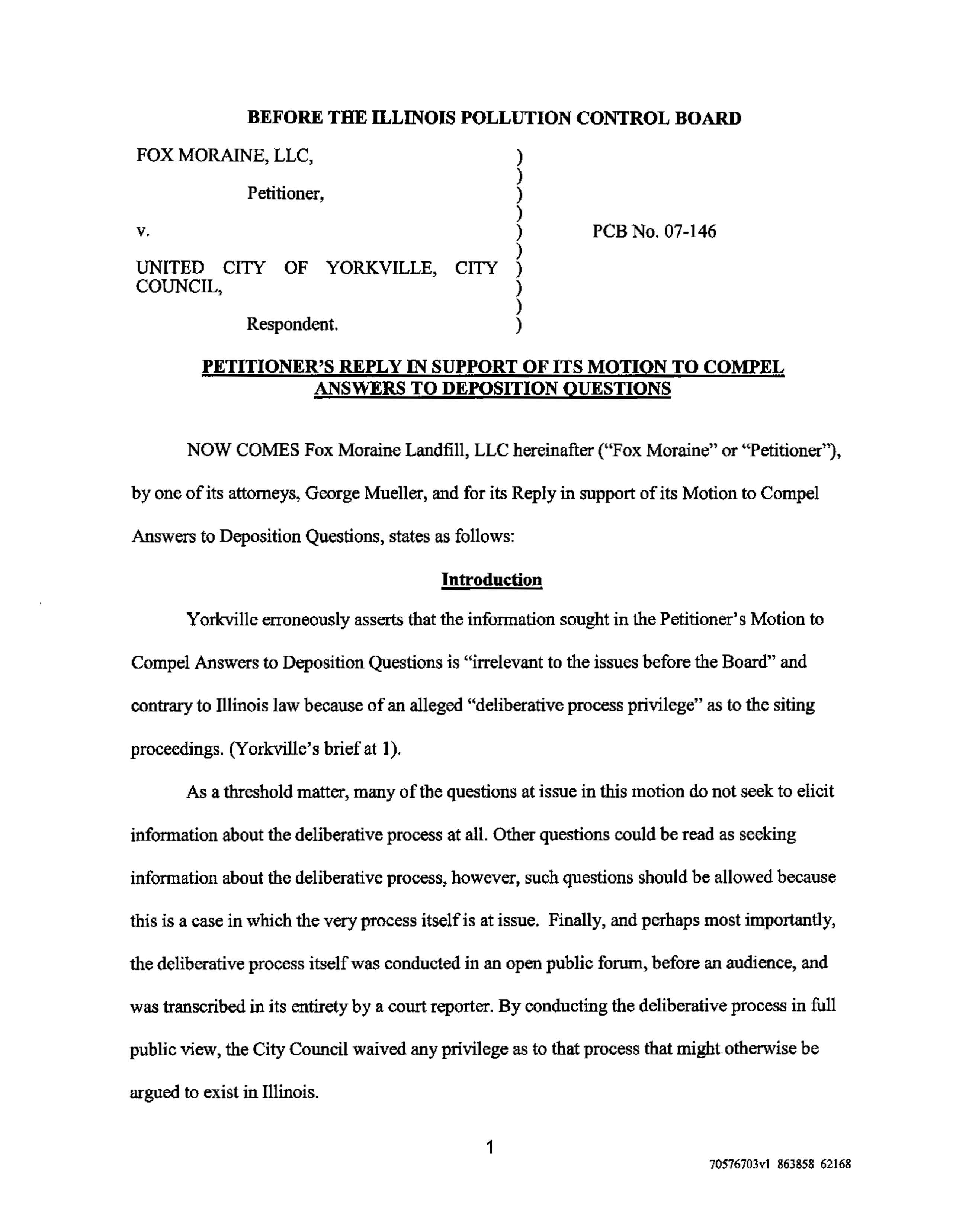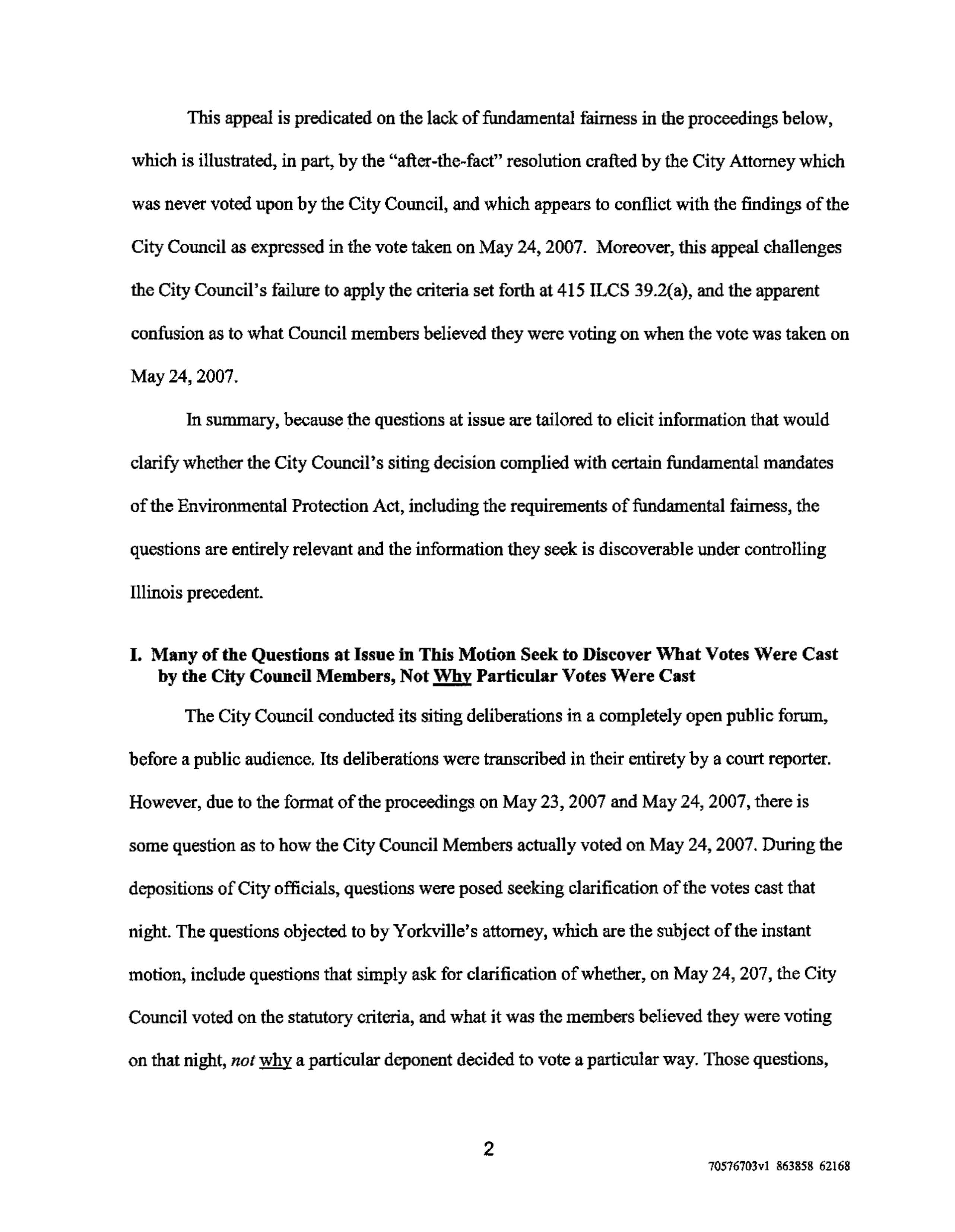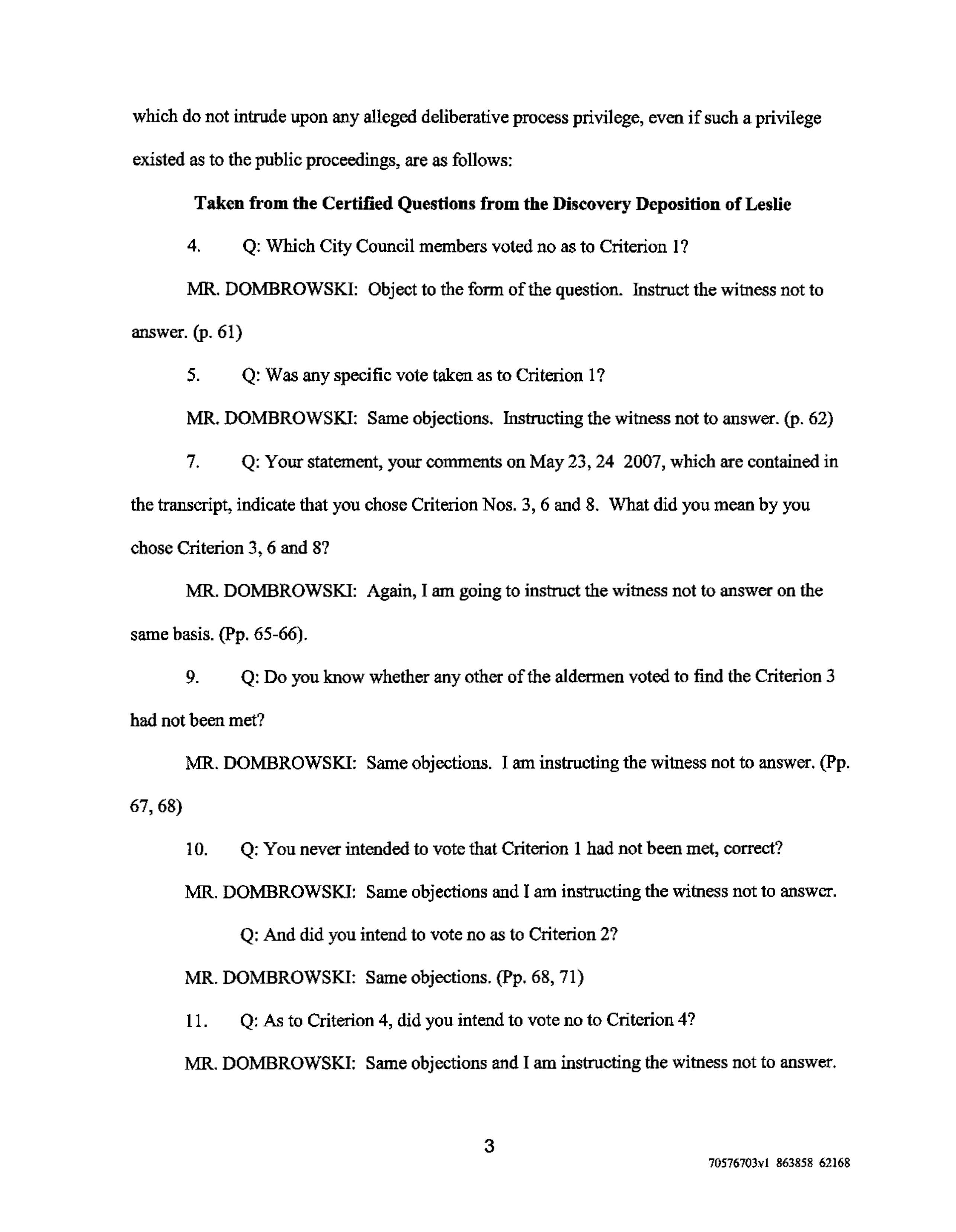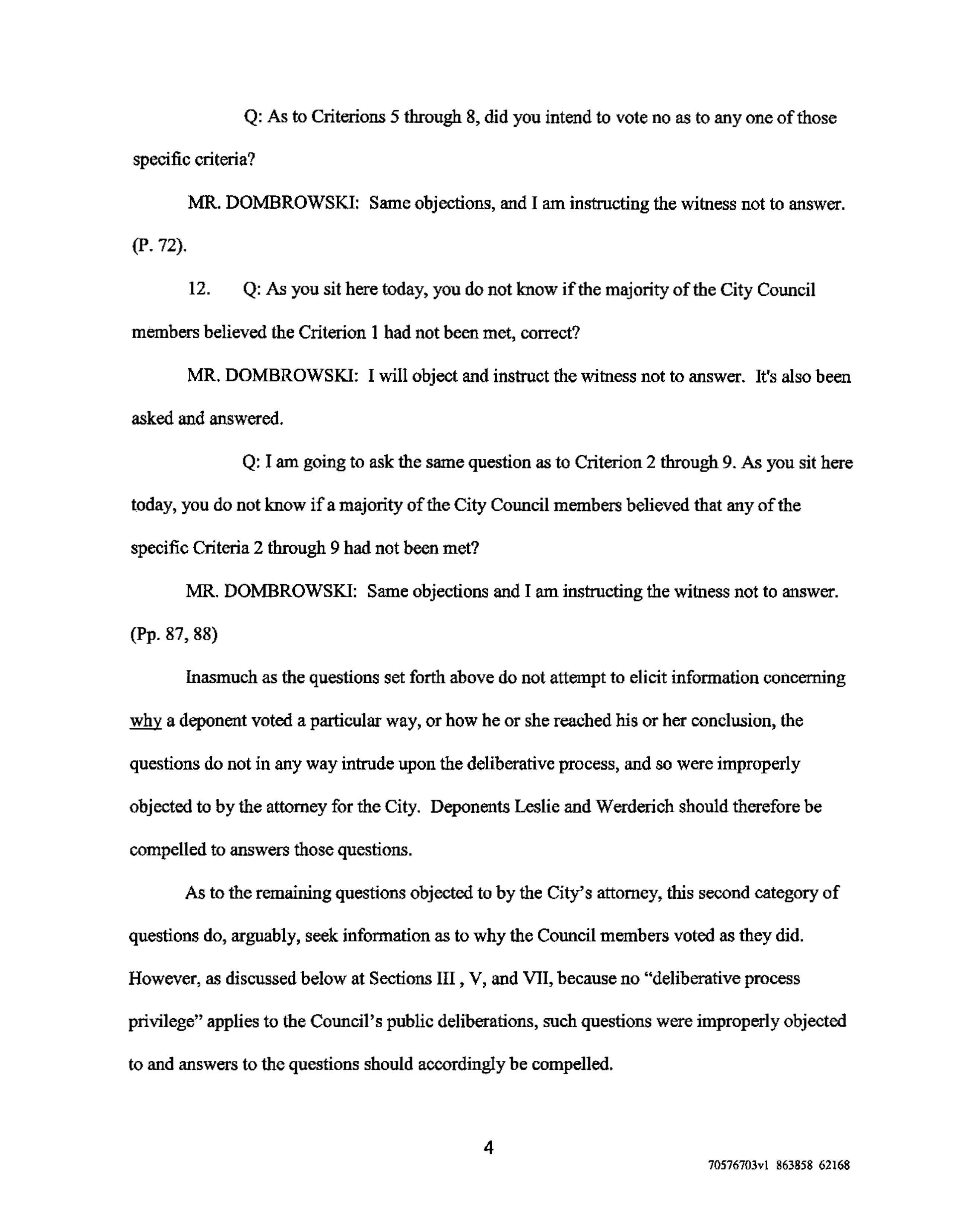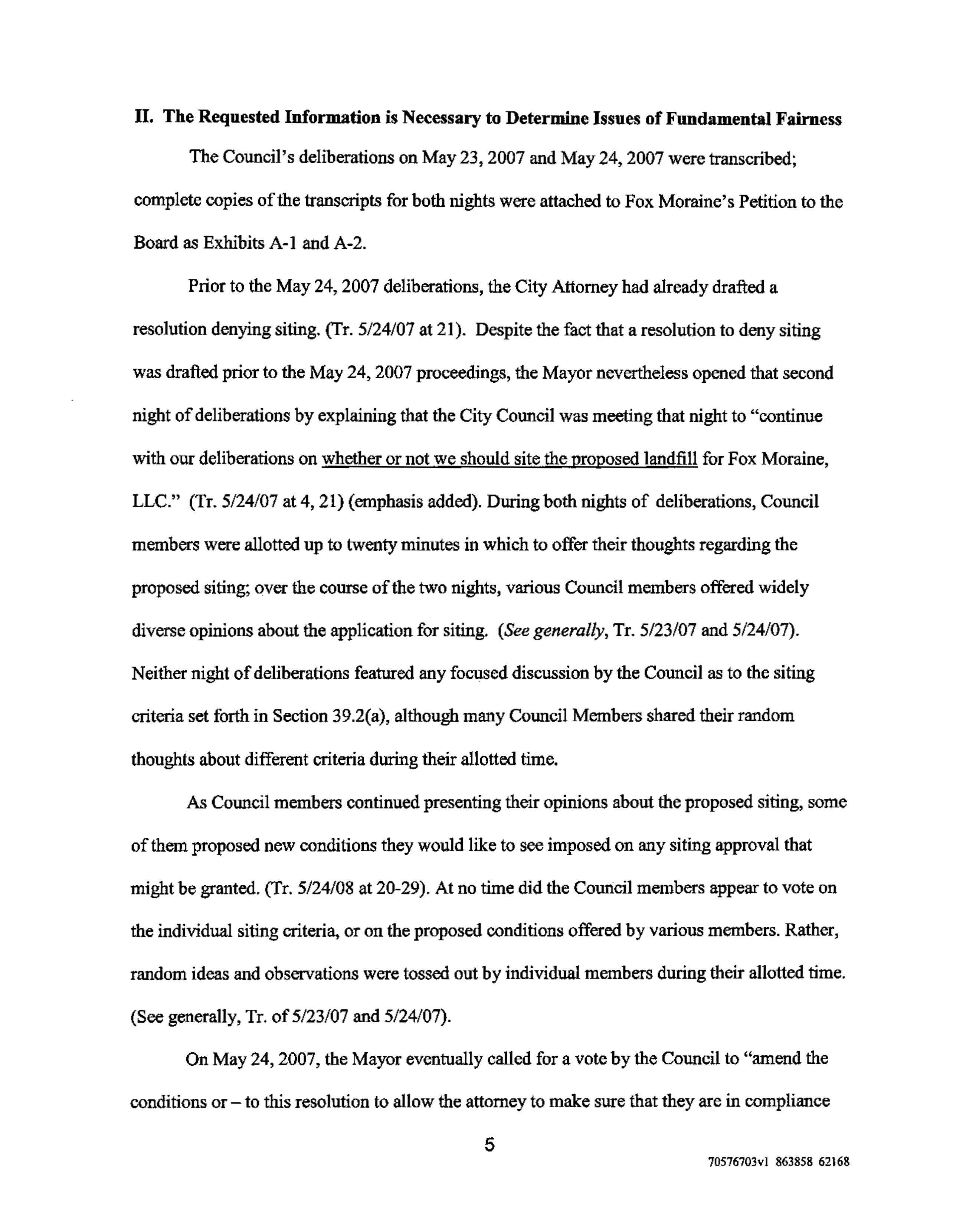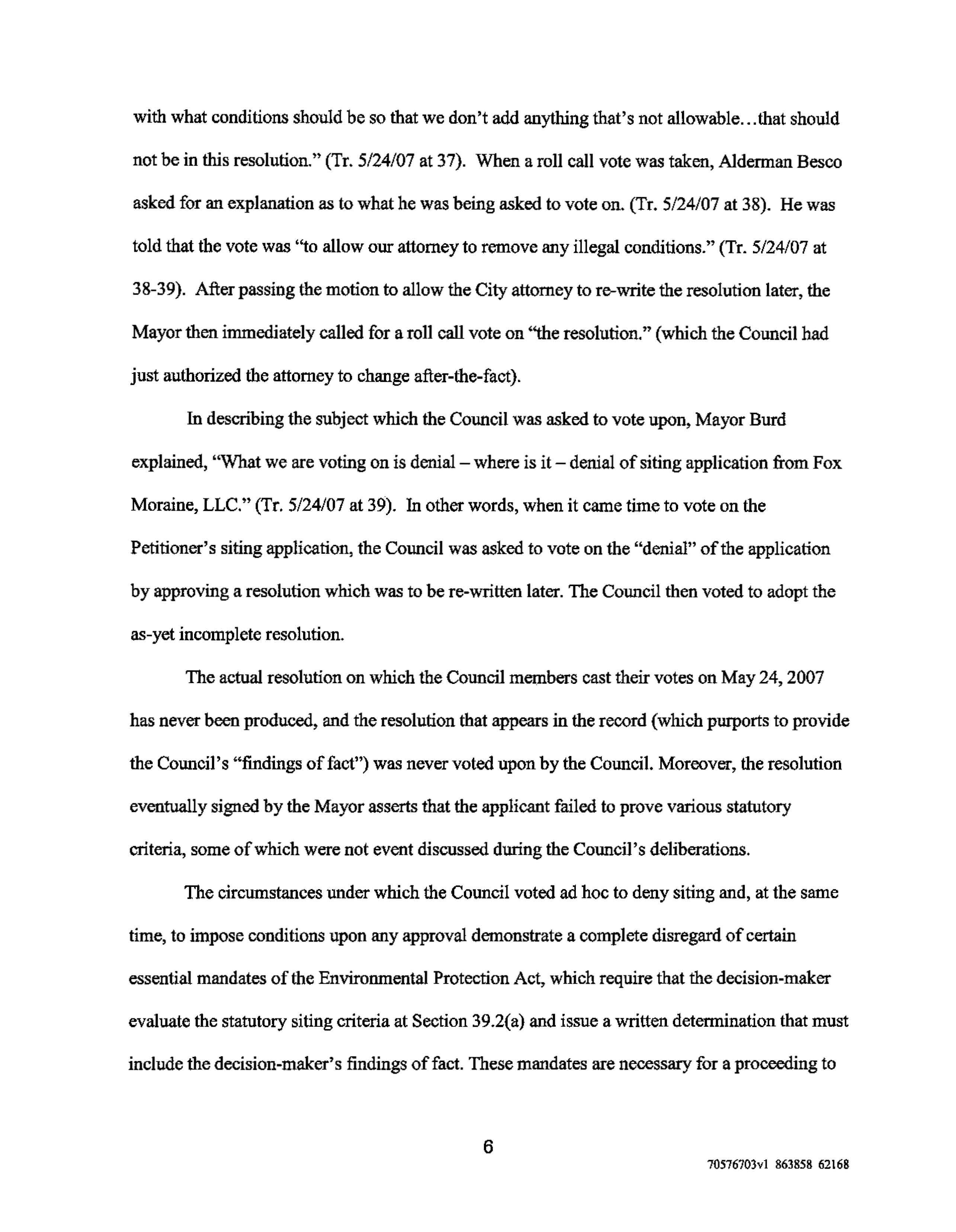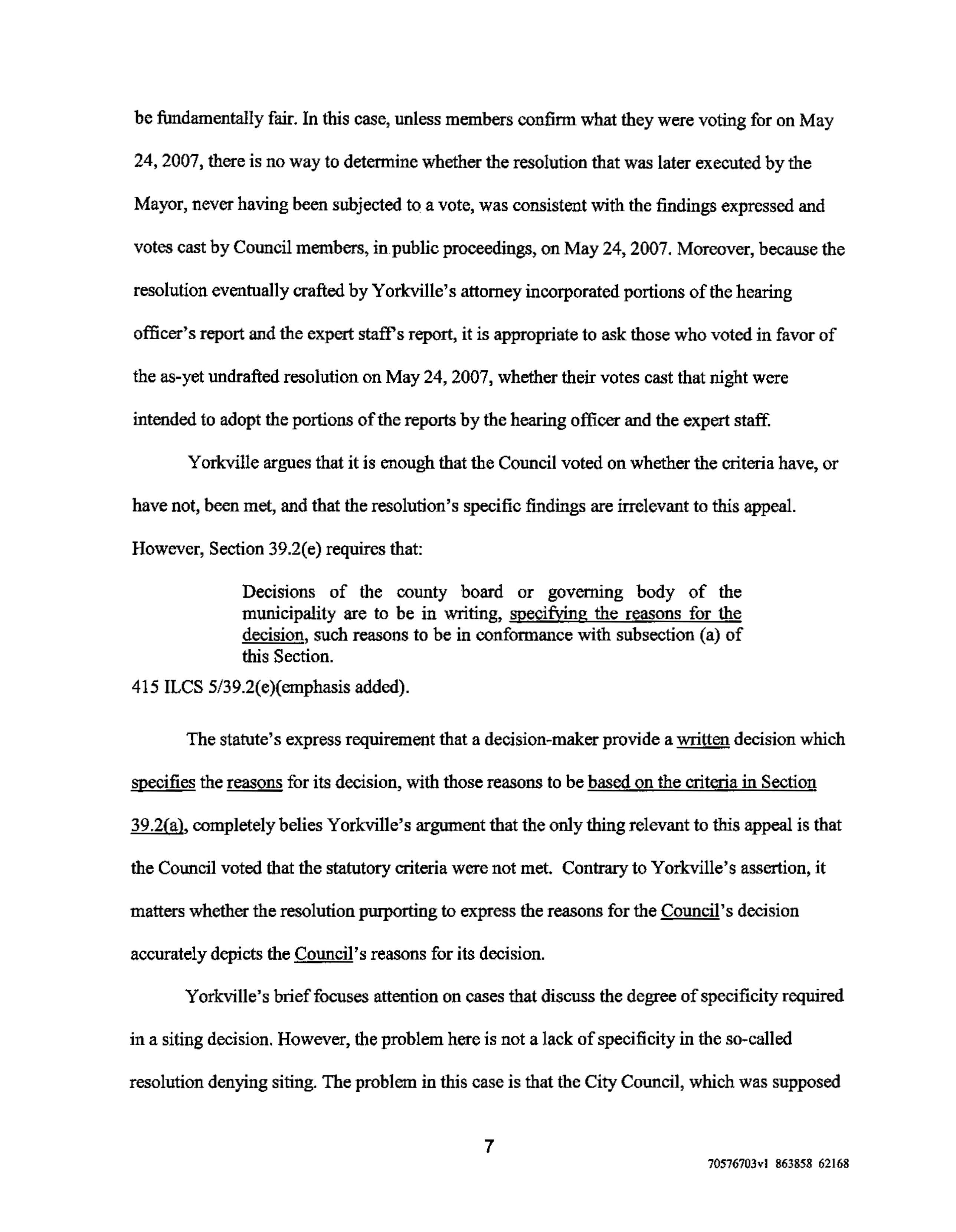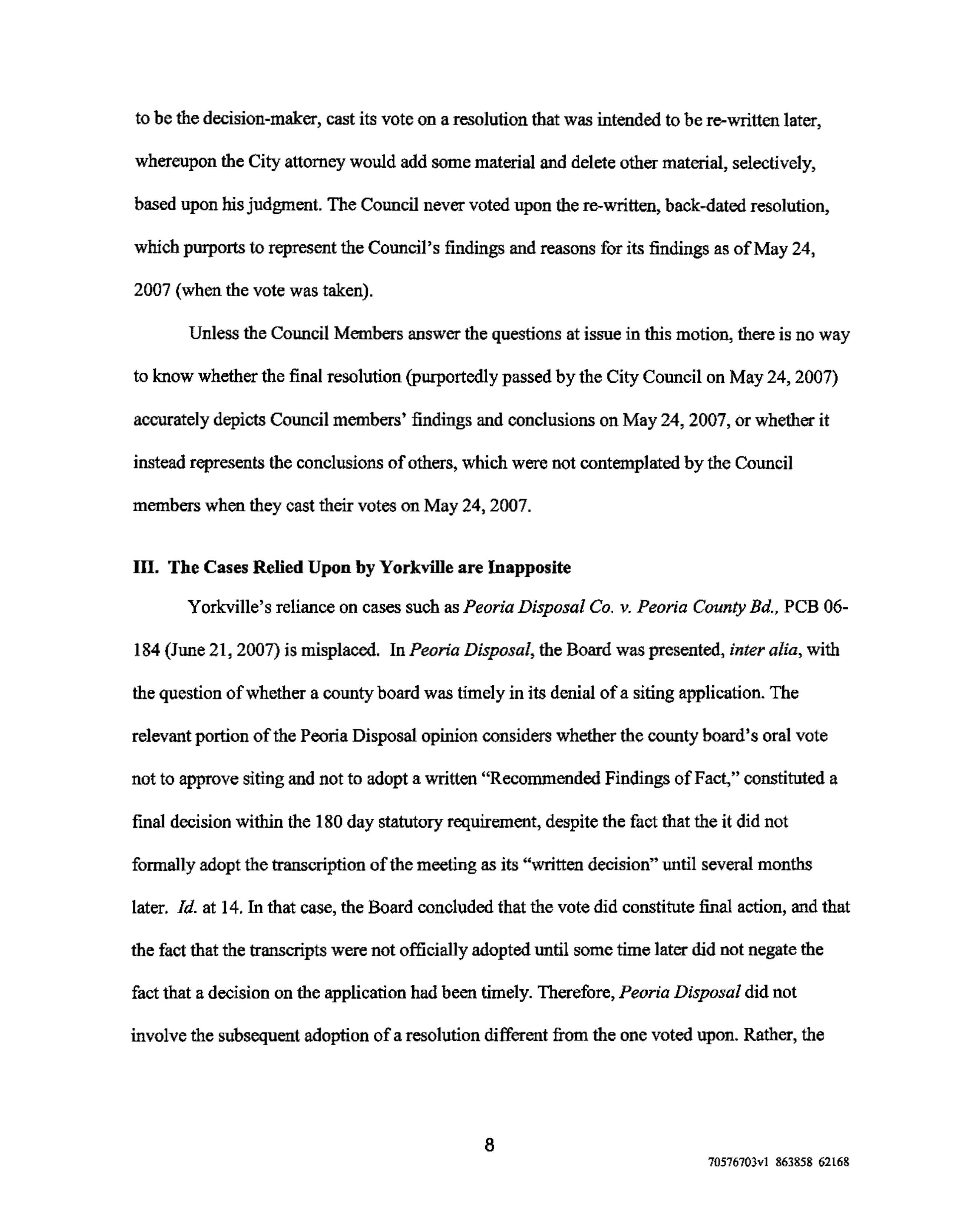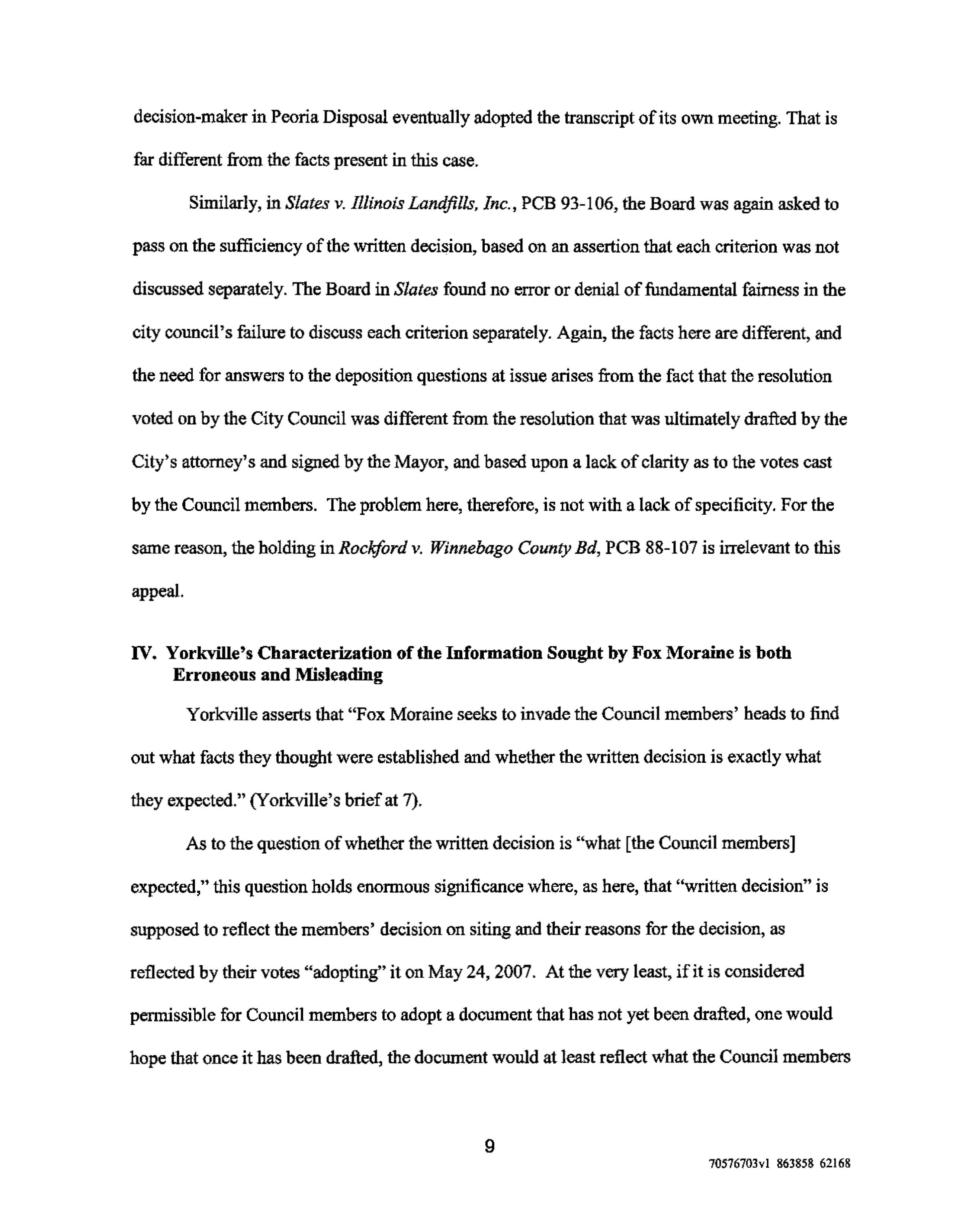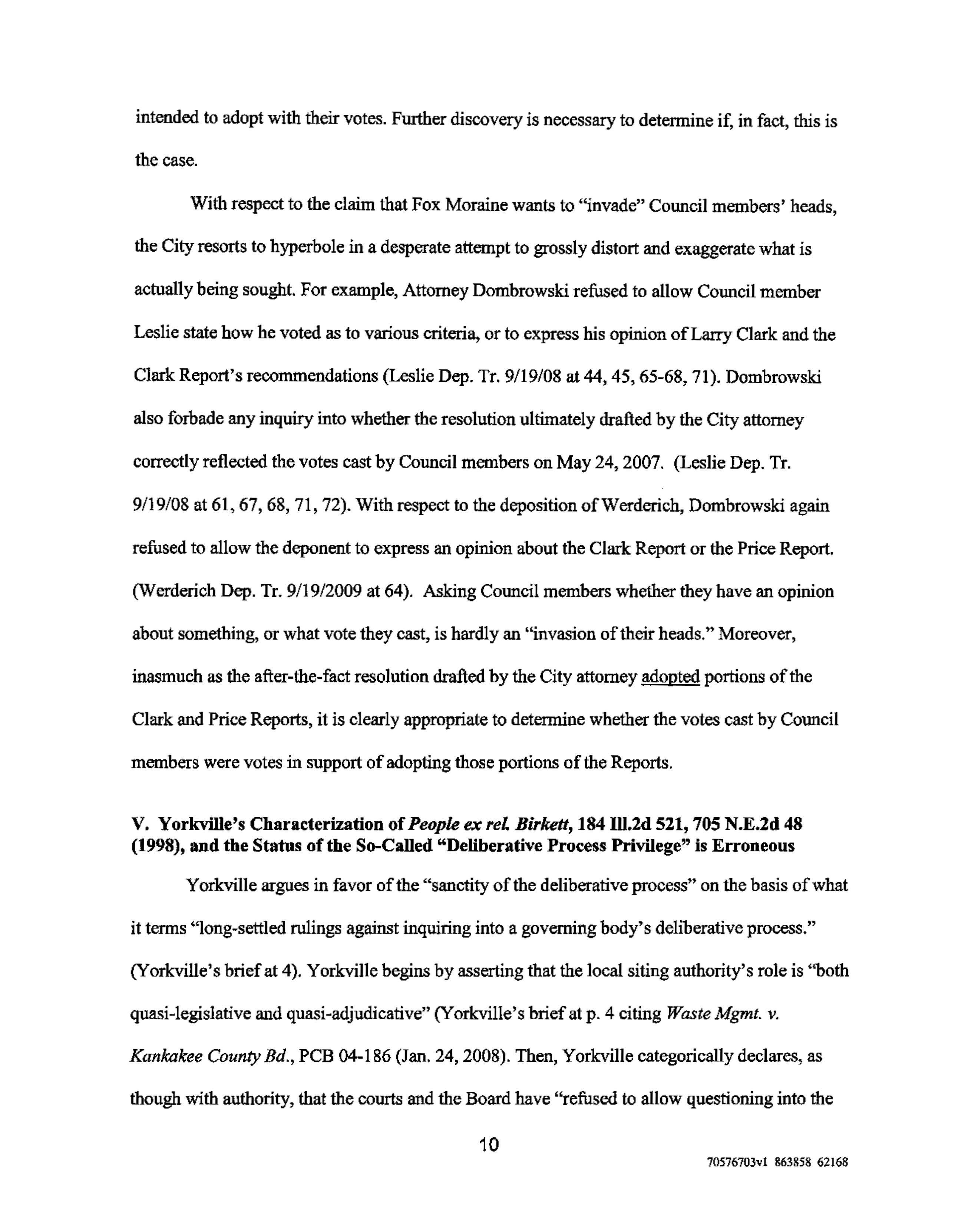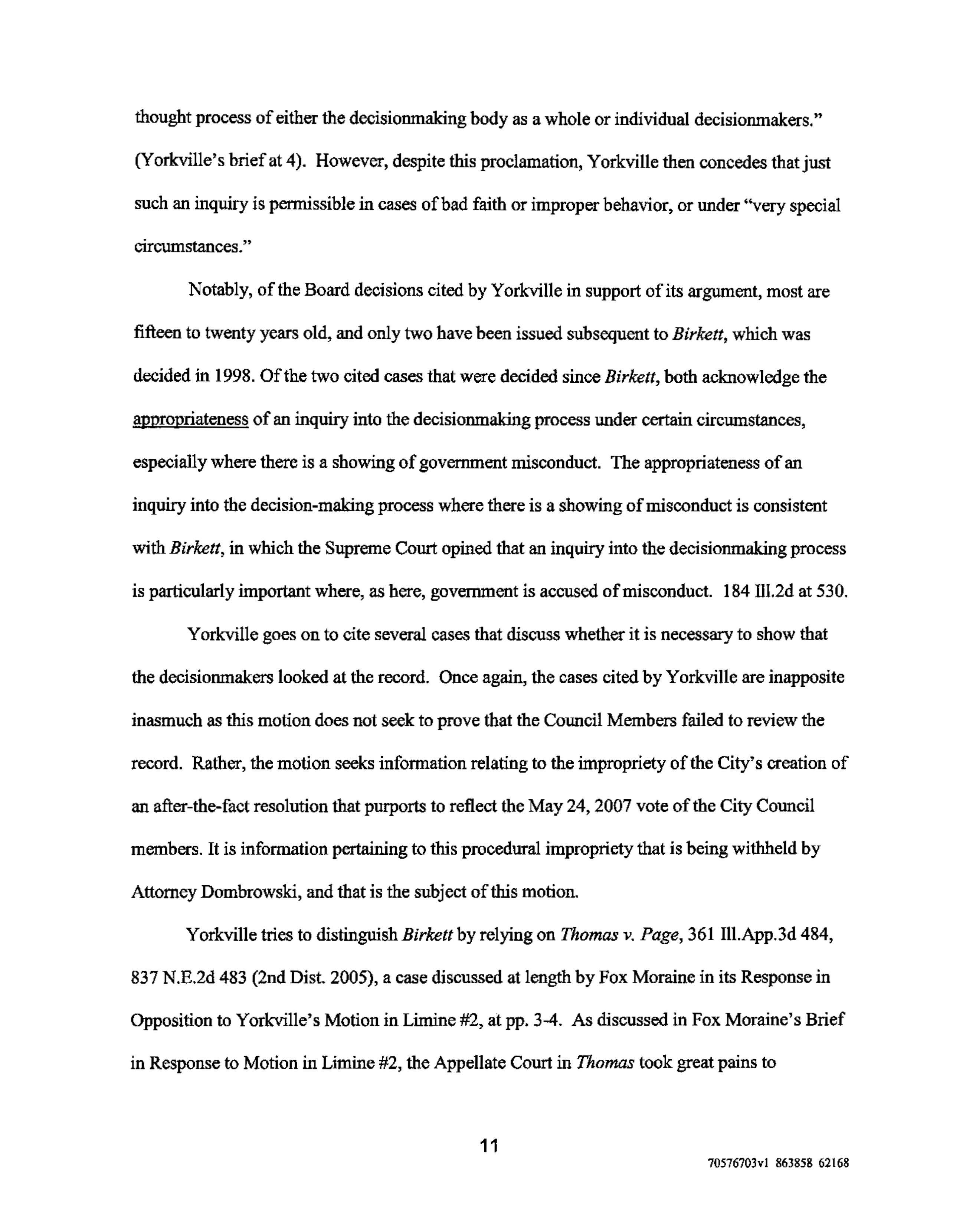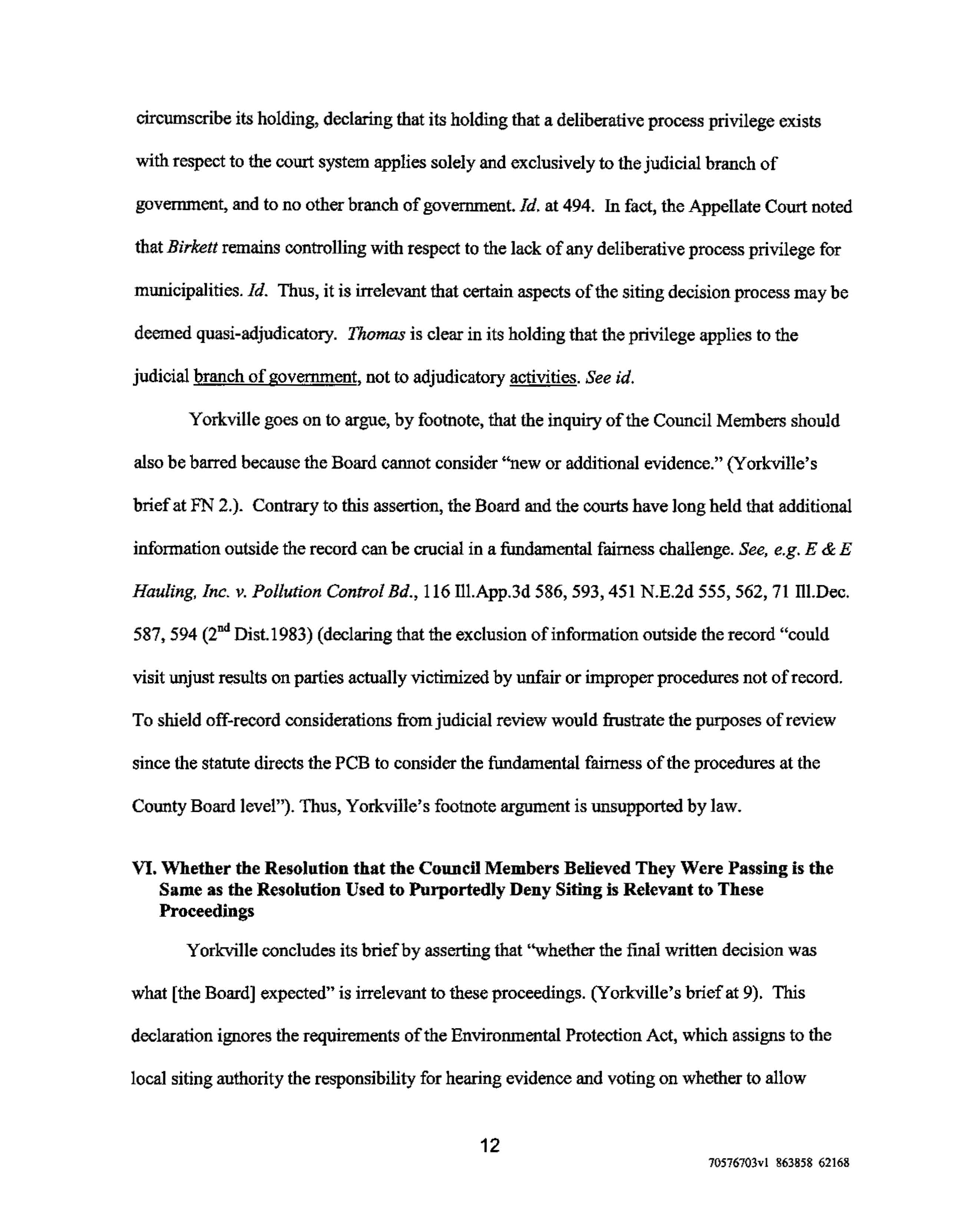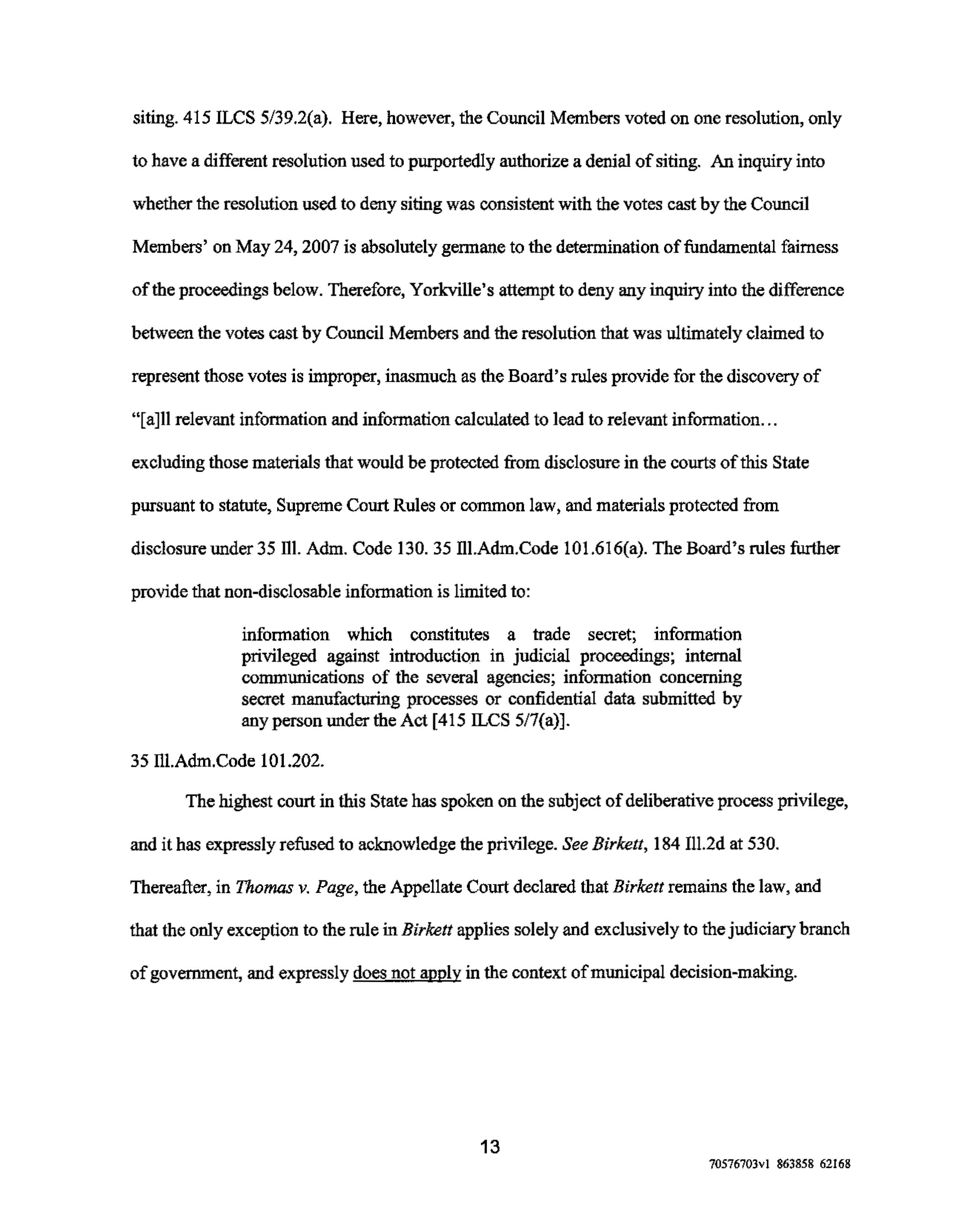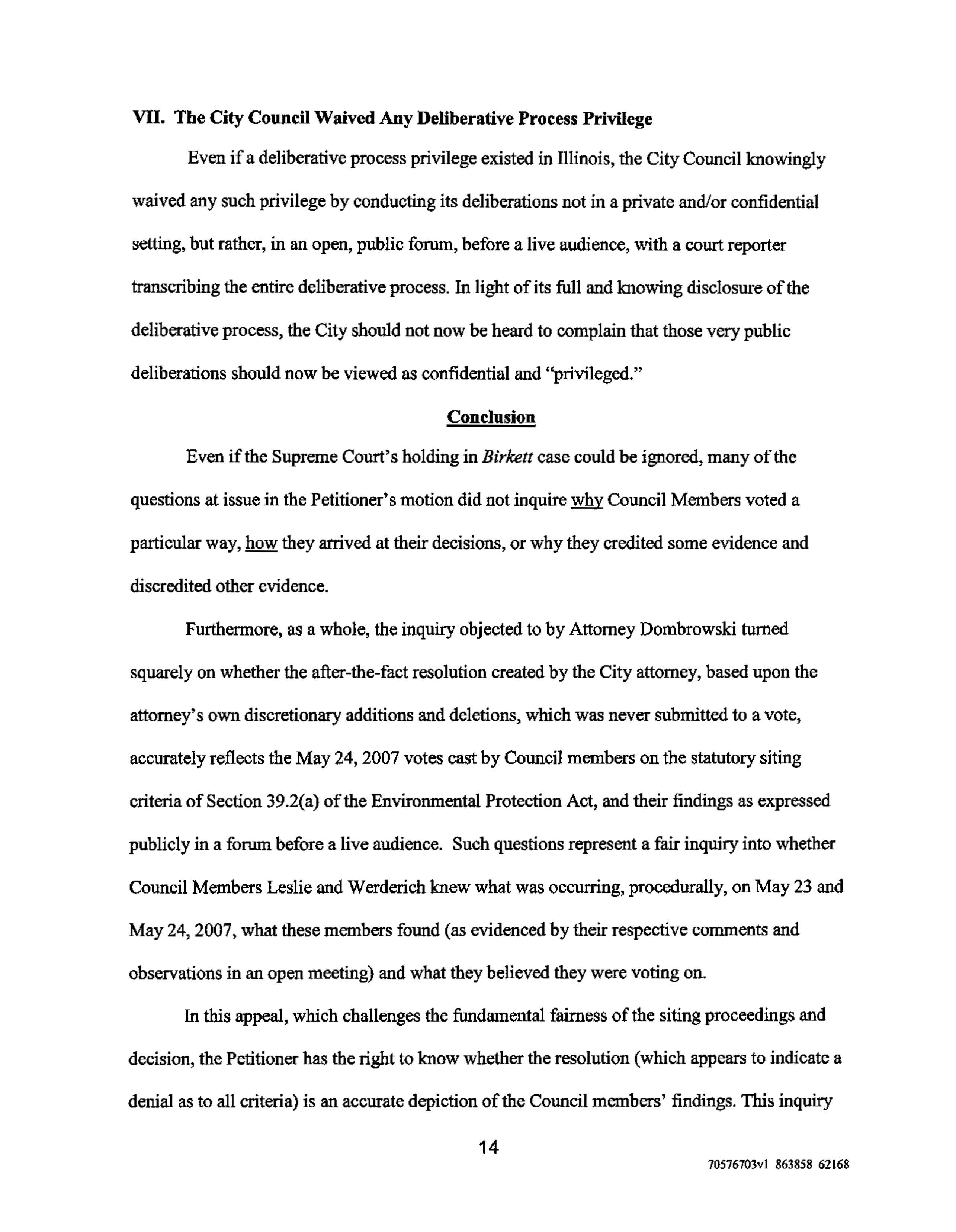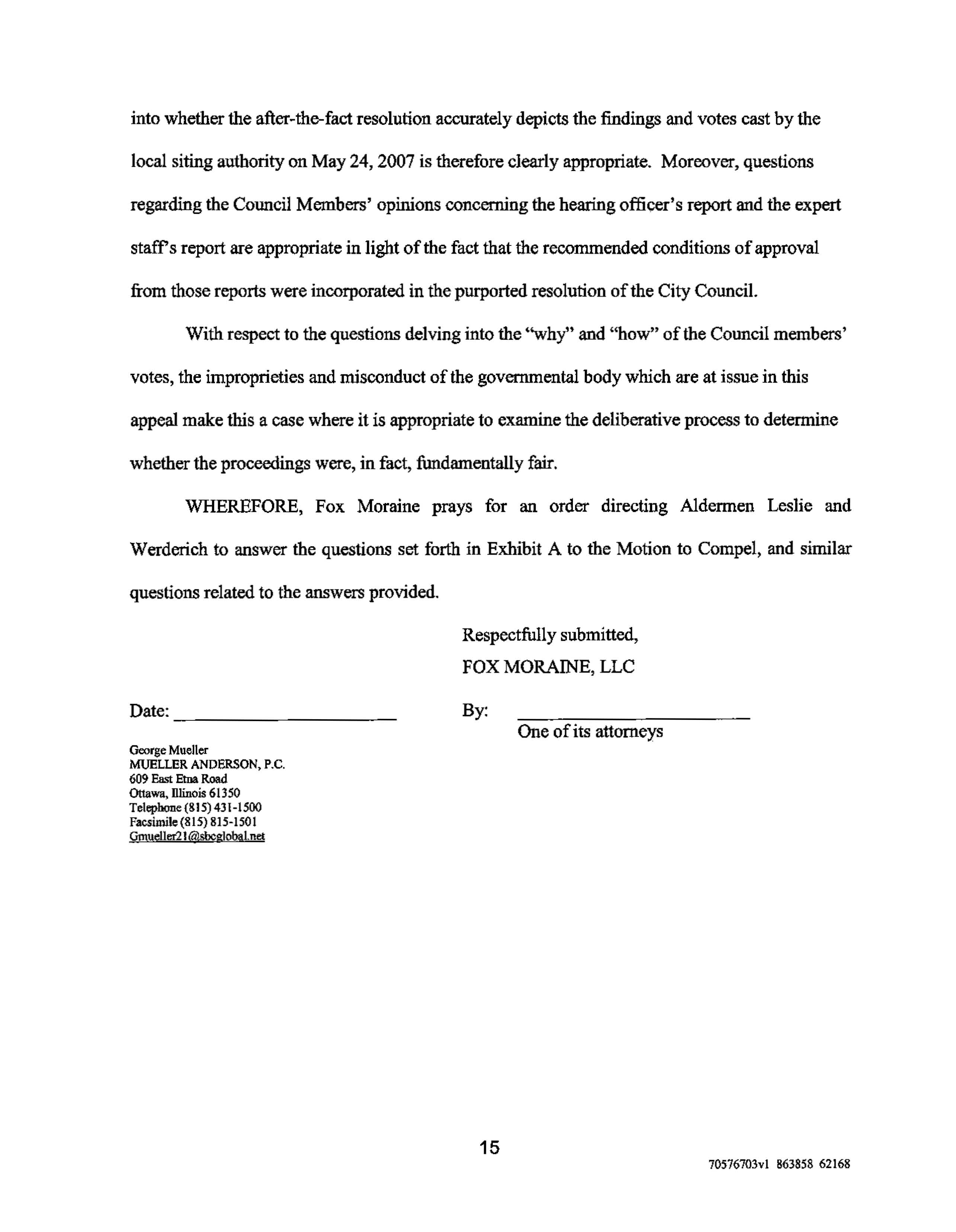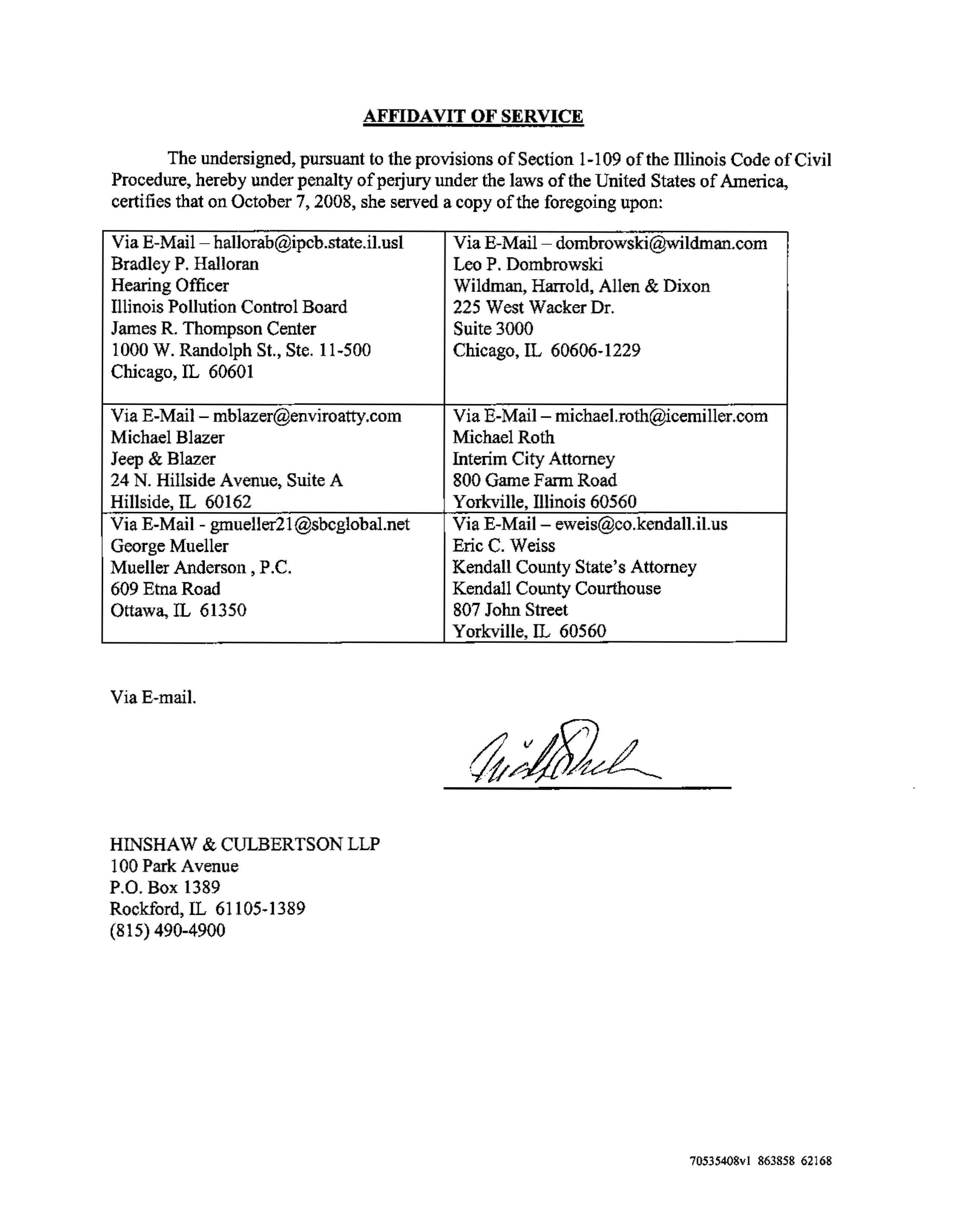BEFORE THE ILLINOIS POLLUTION CONTROL BOARD
FOX MORAINE, LLC,
Petitioner,
v.
UNITED CITY OF YORKVILLE, CITY
COUNCIL,
Respondent.
)
)
)
)
)
)
)
)
)
)
PCB No. PCB 07-146
NOTICE OF FILING
TO:
All counsel of Record (see attached Service List)
Please take notice that on October 7, 2008, the undersigned filed with the Illinois
Pollution Control Board, 100 West Randolph Street, Chicago, Illinois 60601, Petitioner's Reply
in Support
of Motion to Compel Answers to Deposition Questions.
Dated:
October 7, 2008
George Mueller
MUELLER ANDERSON, P.C.
609 East Etna Road
Ottawa, IL 61350
Telephone (815) 431-1500
Facsimile (815) 815-1501
Gmueller21@sbcglobal.net
Respectfully submitted,
On behalfofFOX MORAINE, LLC
lsi
George Mueller
One
of Its Attorneys
This document utilized 100% recycled paper products.
70535423vl 863858 62168
Electronic Filing - Received, Clerk's Office, October 7, 2008
PCB No. 07-146
BEFORE THE ILLINOIS POLLUTION CONTROL BOARD
FOX MORAINE, LLC,
)
)
Petitioner,
)
)
v.
)
)
UNITED CITY OF YORKVILLE, CITY )
COUNCIL,
)
)
Respondent.
)
PETITIONER'S REPLY IN SUPPORT OF ITS MOTION TO COMPEL
ANSWERS TO DEPOSITION OUESTIONS
NOW COMES Fox Moraine Landfill, LLC hereinafter ("Fox Moraine" or "Petitioner"),
by one ofits attorneys, George Mueller, and for its Reply in support of its Motion to Compel
Answers to Deposition Questions, states as follows:
Introduction
Yorkville erroneously asserts that the infonnation sought in the Petitioner'sMotion to
Compel Answers to Deposition Questions is "irrelevant to the issues before the Board" and
contrary
to
Illinois law because of an alleged "deliberative process privilege" as to the siting
proceedings. (Yorkville's
brief at 1).
As
a threshold matter, many of the questions at issue in this motion do not seek to elicit
infonnation about the deliberative process at
alL Other questions could be read as seeking
infonnation about the deliberative process, however, such questions should
be allowed because
this is a case in which the very process
itselfis at issue. Finally, and perhaps most importantly,
the deliberative process
itselfwas conducted in an open public forum, before an audience, and
was transcribed
in
its entirety by a court reporter. By conducting the deliberative process in full
public view, the City Council waived any privilege as to that process
that might otherwise be
argued
to
exist in Illinois.
1
70S76703vl 863858 62168
Electronic Filing - Received, Clerk's Office, October 7, 2008
This appeal is predicated on the lack of fundamental fairness in the proceedings below,
which is illustrated, in part,
by the "after-the-fact" resolution crafted by the City Attorney which
was never voted upon
by the City Council, and which appears to conflict
with
the findings ofthe
City Council as expressed
in
the vote taken on May 24,2007. Moreover, this appeal challenges
the City Council'sfailure to apply the criteria set forth
at 415 ILCS 39.2(a), and the apparent
confusion as to what Council members believed they were voting
on when the vote was taken on
May 24, 2007.
In
summary, because the questions at issue are tailored to elicit information that would
clarify whether the City Council'ssiting decision complied with certain fundamental mandates
ofthe Environmental Protection Act, including the requirements of fundamental fairness, the
questions are entirely relevant and the information they seek is discoverable under controlling
Illinois precedent.
I. Many of the Questions at Issue in This Motion Seek to Discover What Votes Were Cast
by the City Council Members, Not Why Particular Votes Were
Cast
The City Council conducted its siting deliberations in a completely open public forwn,
before a public audience. Its deliberations were transcribed
in their entirety by a court reporter.
However, due to the format
ofthe proceedings on May 23,2007 and May 24,2007, there is
some question as to
how the City Council Members actually voted on May 24, 2007. During the
depositions
of City officials, questions were posed seeking clarification ofthe votes cast that
night.
The questions objected to by Yorkville's attorney, which are the subject of the instant
motion, include questions that simply ask for clarification
ofwhether, on May 24,207, the City
Council voted
on the statutory criteria, and what it was the members believed they were voting
on that night,
not
why a particular deponent decided to vote a particular way. Those questions,
2
70S76703vl 863858 62168
Electronic Filing - Received, Clerk's Office, October 7, 2008
which do not intrude upon any alleged deliberative process privilege, even if such a privilege
existed as to the public proceedings, are as follows:
Taken from the Certified Questions from the Discovery Deposition of Leslie
4.
Q: Which City Council members voted no as to Criterion I?
MR.. DOMBROWSKI: Object to the form ofthe question. Instruct the witness not to
answer.
(p. 61)
5.
Q: Was any specific vote taken as to Criterion I?
MR. DOMBROWSKI: Same objections. Instructing the witness not to answer. (p. 62)
7.
Q: Your statement, your comments on May 23, 24 2007, which are contained in
the transcript, indicate that you chose Criterion Nos. 3, 6 and 8. What did you mean by you
chose Criterion
3, 6 and 8?
MR. DOMBROWSKI: Again, I am going to instruct the witness not to answer on the
same basis. (pp. 65-66).
9.
Q: Do you know whether any other ofthe aldermen voted to find the Criterion 3
had not been met?
MR. DOMBROWSKI: Same objections. I am instructing the witness not to answer. (pp.
67,68)
10.
Q: You never intended to vote that Criterion 1 had not been met, correct?
MR. DOMBROWSKI: Same objections and I am instructing the witness not
to
answer.
Q: And did you intend to Yote no as to Criterion 2?
MR. DOMBROWSKI: Same objections. (pp. 68, 71)
11.
Q: As to Criterion 4, did you intend to Yote no to Criterion 4?
MR. DOMBROWSKI: Same objections and I am instructing the witness not to answer.
3
70576703vl 863858 62168
Electronic Filing - Received, Clerk's Office, October 7, 2008
Q: As to Criterions 5 through 8, did you intend to vote no as to anyone ofthose
specific criteria?
MR.
DOMBROWSKI: Same objections, and I am instructing the witness not to answer.
(p.72).
12.
Q: As you sit here today, you do not know ifthe majority of the City COWlcil
members believed the Criterion 1 had not been met, correct?
MR.
DOMBROWSKI: I will object and instruct the witness not
to
answer. It's also been
asked and answered.
Q: I
am going to ask the same question as to Criterion 2 through 9. As you sit here
today, you
do not know if a majority ofthe City Council members believed that any ofthe
specific Criteria 2 through 9 had not been met?
MR. DOMBROWSKI: Same objections and I am instructing the witness not to answer.
(Pp. 87, 88)
Inasmuch as the questions set forth above do not attempt to elicit information concerning
why a deponent voted a particular way, or how he or she reached his or her conclusion, the
questions
do not in any way intrude upon the deliberative process, and so were improperly
objected
to
by the attorney for the City. Deponents Leslie and Werderich should therefore be
compelled to answers those questions.
As
to the remaining questions objected to by the City's attorney, this second category of
questions do, arguably, seek information as to why the COWlcil members voted as they did.
However, as discussed
below at Sections III, V, and VII, because no "deliberative process
privilege" applies to the COWlcil's public deliberations,
such questions were improperly objected
to and answers
to the questions should accordingly be compelled.
4
70576703vl 863858 62168
Electronic Filing - Received, Clerk's Office, October 7, 2008
II. The Requested Information is Necessary to Determine Issues of Fundamental Fairness
The Council'sdeliberations on May 23,2007 and May 24,2007 were transcribed;
complete copies
ofthe transcripts for both nights were attached
to
Fox Moraine'sPetition to the
Board
as Exhibits A-1 and A-2.
Prior to the May 24, 2007 deliberations, the City Attorney had already drafted a
resolution denying siting.
(Tr. 5/24/07 at 21). Despite the fact that a resolution to deny siting
was drafted prior to the May 24,2007 proceedings, the Mayor nevertheless opened that second
night
ofdeliberations by explaining that the City Council was meeting that night to "continue
with our deliberations on whether or not we should site the proposed landfill for Fox Moraine,
LLC." (Tr. 5/24/07 at 4,
21 ) (emphasis added). During both nights of deliberations, Council
members were allotted up to twenty minutes in which to offer their thoughts regarding the
proposed siting; over the course
ofthe two nights, various Council members offered widely
diverse opinions about the application for siting.
(See generally,
Tr. 5/23/07 and 5/24/07).
Neither night
of deliberations featured any focused discussion by the Council as to the siting
criteria set forth in Section 39.2(a), although many Council Members shared their random
thoughts about different criteria during their allotted time.
As Council members continued presenting their opinions about the proposed siting, some
ofthem proposed new conditions they would like to see imposed on any siting approval that
might be granted. (Tr. 5/24/08 at 20-29). At
no time did the Council members appear to vote on
the individual siting criteria., or on the proposed conditions offered by various members. Rather,
random ideas and observations were tossed out by individual members during their allotted time.
(See generally,
Tr. of 5/23/07 and 5/24/07).
On
May 24, 2007, the Mayor eventually called for a vote by the Council to "amend the
conditions or - to this resolution to allow the attorney to make sure that they are in compliance
5
70576703v) 863858 62168
Electronic Filing - Received, Clerk's Office, October 7, 2008
with what conditions should be so that we don't add anything that's not allowable...that should
not
be in this resolution." (Tr. 5/24/07 at 37). When a roll call vote was taken, Alderman Besco
asked for an explanation as to
what he was being asked to vote on. (Tr. 5/24/07 at 38). He was
told that the vote was ''toallow
our attorney to remove any illegal conditions." (Tr. 5/24/07 at
38-39). After passing the
motion to allow the City attorney to re-write the resolution later, the
Mayor then immediately called for a roll call vote on ''theresolution." (which the Council
had
just authorized the attorney to change after-the-fact).
In
describing the subject which the Council was asked to vote upon, Mayor Burd
explained,
"What we are voting on is denial- where is it - denial of siting application from Fox
Moraine, LLC." (Tr. 5/24/07 at 39).
In
other words, when it came time to vote on the
Petitioner's siting application,
the Council was asked to vote on the "denial" ofthe application
by approving a resolution which was to be re-written later. The Council then voted to adopt the
as-yet incomplete resolution.
The actual resolution on which the Council members cast their votes on May 24, 2007
has never been produced, and
the resolution that appears in the record (which purports to provide
the Council's"findings
offact") was never voted upon by the Council. Moreover, the resolution
eventually signed
by the Mayor asserts that the applicant failed to prove various statutory
criteria, some
ofwhich were not event discussed during the Council'sdeliberations.
The circumstances under which the Council voted ad hoc to deny siting and, at the same
time, to impose conditions upon
any approval demonstrate a complete disregard ofcertain
essential mandates
of the Environmental Protection Act, which require that the decision-maker
evaluate the statutory siting criteria
at Section 39.2(a) and issue a written detennination that must
include the decision-maker's findings offact. These mandates are necessary for a proceeding to
6
70576703vl 863858 62168
Electronic Filing - Received, Clerk's Office, October 7, 2008
be fundamentally fair.
In
this case, unless members confinn what they were voting for on May
24,2007, there is no way to detennine whether the resolution that was later executed by the
Mayor, never having been subjected
to a vote, was consistent with the findings expressed and
votes cast
by Council members, in public proceedings, on May 24,2007. Moreover, because the
resolution eventually crafted
by Yorkville'sattorney incorporated portions of the hearing
officer'sreport and the expert staff'sreport, it is appropriate to ask those who voted in favor of
the as-yet undrafted resolution on May 24, 2007, whether their votes cast that night were
intended to adopt the portions
ofthe reports by the hearing officer and the expert staff.
Yorkville argues that it is enough that the Council voted on whether the criteria have, or
have not, been met, and that the resolution's specific findings are irrelevant to this appeal.
However, Section 39.2(e) requires that:
Decisions
of the county board or governing body of the
municipality are
to
be in writing, specifying the reasons for the
decision, such reasons to be in conformance with subsection (a) of
this Section.
415 ILCS 5/39.2(e)(emphasis added).
The statute'sexpress requirement that a decision-maker provide a written decision which
specifies the reasons for its decision, with those reasons to
be based on the criteria in Section
39.2(a), completely belies Yorkville's argument that the only thing relevant
to
this appeal is that
the Council voted that the statutory criteria were not met. Contrary to Yorkville's assertion, it
matters whether the resolution purporting
to
express the reasons for the Council'sdecision
accurately depicts the Council'sreasons for its decision.
Yorkville'sbrief focuses attention on cases that discuss the degree
of specificity required
in a siting decision. However, the problem here is not a lack of specificity in the so-called
resolution denying siting. The problem in this case is that the City Council, which was supposed
7
70576703vl 863858 62168
Electronic Filing - Received, Clerk's Office, October 7, 2008
to be the decision-maker, cast its vote on a resolution that was intended to be re-written later,
whereupon the City attorney would add some material and delete other material, selectively,
based upon his judgment. The Council never voted upon the
re--written, back-dated resolution,
which purports
to represent the Council's findings and reasons for its findings as ofMay 24,
2007 (when the vote was taken).
Unless the Council Members answer the questions at issue
in this motion, there is no way
to know whether the final resolution
(purportedly passed by the City Council on May 24, 2007)
accurately depicts Council members' findings and conclusions
on May 24,2007, or whether it
instead represents the conclusions
of others, which were not contemplated by the Council
members when they cast their votes on May 24, 2007.
III. The Cases Relied Upon by Yorkville are Inapposite
Yorkville'sreliance on cases such as
Peoria Disposal Co. v. Peoria County Bd.,
PCB 06-
184 (June
21,2007) is misplaced. In
Peoria Disposal,
the Board was presented,
inter alia,
with
the question
ofwhether a county board was timely in its denial of a siting application. The
relevant portion
ofthe Peoria Disposal opinion considers whether the county board'soral vote
not to approve siting and not to adopt a written "Recommended Findings of Fact," constituted a
final decision within the 180 day statutory requirement, despite the fact that the
it did not
formally adopt the transcription ofthe meeting as its "written decision" until several months
later.
Id.
at 14.
In
that case, the Board concluded that the vote did constitute final action, and that
the fact that the transcripts were
not officially adopted until some time later did not negate the
fact that a decision on the application had been timely. Therefore,
Peoria Disposal
did not
involve the subsequent adoption
of a resolution different
from
the one voted upon. Rather, the
8
70576703vl 863858 62t68
Electronic Filing - Received, Clerk's Office, October 7, 2008
decision-maker in Peoria Disposal eventually adopted the transcript ofits own meeting. That is
far different from the facts present
in
this case.
Similarly,
in
Slates
v.
Illinois Landfills, Inc.,
PCB 93-106, the Board was again asked
to
pass on the sufficiency of the written decision, based on an assertion that each criterion was not
discussed separately. The Board
in
Slates
found no error or denial of fundamental fairness in the
city council'sfailure to discuss each criterion separately. Again, the facts here are different, and
the need for answers to the deposition questions at issue arises from the fact that the resolution
voted on
by the City Council was different from the resolution that was ultimately drafted by the
City'sattorney'sand signed
by the Mayor, and based upon a lack of clarity as to the votes cast
by the Council members. The problem here, therefore, is not with a lack of specificity. For the
same reason, the holding in
Rockford
v.
Winnebago County Bd,
PCB 88-107 is irrelevant to this
appeal.
IV. Yorkville'sCharacterization of the Information Sought by Fox Moraine is both
Erroneous and Misleading
Yorkville asserts that "Fox Moraine seeks to invade the Council members' heads
to
find
out what facts they thought were established and whether the written decision is exactly what
they expected." (Yorkville's
briefat 1).
As
to the question of whether the written decision is "what [the Council members]
expected," this question holds enormous significance where, as here, that "written decision" is
supposed to reflect the members' decision on siting and their reasons for the decision, as
reflected by their votes "adopting" it on May 24, 2007. At the very least, ifit is considered
pennissible for Council members to adopt a document that has not yet been drafted, one would
hope that once it has been drafted, the document would at least reflect what the Council members
9
70S76703vl 863858 6216&
Electronic Filing - Received, Clerk's Office, October 7, 2008
intended to adopt with their votes. Further discovery is necessary to detennine if, in fact, this is
the case.
With respect to the claim that Fox Moraine wants to "invade" Council members' heads,
the City resorts to hyperbole in a desperate attempt to grossly distort and exaggerate what is
actually being sought. For example, Attorney Dombrowski refused to allow Council member
Leslie state how
he voted as to various criteria, or to express his opinion ofLarry Clark and the
Clark Report'srecommendations (Leslie Dep. Tr. 9/19/08 at
44,45,65-68, 71). Dombrowski
also forbade any inquiry into whether the resolution ultimately drafted by the City attorney
correctly reflected the votes cast
by Council members on May 24,2007. (Leslie Dep. Tr.
9/19/08 at 61,
67,68, 71, 72). With respect
to
the deposition ofWerderich, Dombrowski again
refused to allow the deponent to express an opinion about the Clark Report
or the Price Report.
(Werderich Dep. Tr. 9/19/2009 at 64). Asking Council members whether they have an opinion
about something, or what vote they cast, is hardly an
'lnvasion oftheir heads." Moreover,
inasmuch as the after-the-fact resolution drafted by the City attorney adopted portions ofthe
Clark and Price Reports, it is clearly appropriate to detemtine whether the votes cast
by Council
members were votes
in support of adopting those portions of the Reports.
V. Yorkville's Characterization of
People ex reL Birkett,
184 m.2d 521,705 N.E.2d 48
(1998), and the Status of the So-Called "Deliberative Process Privilege" is Erroneous
Yorkville argues
in
favor ofthe "sanctity of the deliberative process" on the basis ofwhat
it tenns "long.settled mlings against inquiring into a governing body'sdeliberative process."
(Yorkville'sbrief
at 4). Yorkville begins by asserting that the local siting authority'srole is ''both
quasi-legislative and quasi-adjudicative" (Yorkville'sbrief at p. 4 citing
Waste Mgmt.
v.
Kankakee County Rd.,
PCB 04-186 (Jan. 24, 2008). Then, Yorkville categorically declares, as
though with authority, that the courts and the Board have "refused
to
allow questioning into the
10
70S76703vl
863&S& 62168
Electronic Filing - Received, Clerk's Office, October 7, 2008
thought process of either the decisionmaking body as a whole or individual decisionmakers."
(Yorkville'sbrief at 4). However, despite this proclamation, Yorkville then concedes that just
such an inquiry is pennissible
in cases ofbad faith or improper behavior, or under "very special
circumstances."
Notably,
of the Board decisions cited by Yorkville in support of its argument, most are
fifteen to twenty years old, and only two have been issued subsequent to
Birkett,
which was
decided
in 1998. Ofthe two cited cases that were decided since
Birkett,
both acknowledge the
appropriateness ofan inquiry into the decisionmaking process under certain circumstances,
especially where there is a showing
of government misconduct. The appropriateness of an
inquiry into the decision-making process where there
is a showing ofmisconduct is consistent
with
Birkett,
in which the Supreme Court opined that an inquiry into the decisionmaking process
is particularly important where, as here, government is accused ofmisconduct. 184 1ll.2d at 530.
Yorkville goes
on to cite several cases that discuss whether it is necessary to show that
the decisionmakers looked at the record. Once again, the cases cited by Yorkville are inapposite
inasmuch as this motion does not seek to prove that the Council Members failed to review the
record. Rather, the motion seeks information relating
to the impropriety of the City'screation of
an after-the-fact resolution that purports to reflect the May 24,2007 vote of the City Council
members.
It
is information pertaining to this procedural impropriety that is being withheld by
Attorney Dombrowski, and that is the subject ofthis motion.
Yorkville tries to distinguish
Birkett
by relying on
Thomas v. Page,
361 Ill.App.3d 484,
837 N.E.2d 483 (2nd Dist. 2005), a case discussed at length by Fox Moraine in its Response in
Opposition to Yorkville'sMotion in Limine #2, at pp. 3-4. As discussed in Fox Moraine'sBrief
in Response to Motion in Limine #2, the Appellate Court in
Thomas
took great pains to
11
70576703vl 863858 62168
Electronic Filing - Received, Clerk's Office, October 7, 2008
circumscribe its holding, declaring that its holding that a deliberative process privilege exists
with respect to the court system applies solely and exclusively to the judicial branch of
government, and to no other branch of government.
ld.
at 494.
In
fact, the Appellate Court noted
that
Birkett
remains controlling with respect to the lack
of any deliberative process privilege for
municipalities.
ld.
Thus, it is irrelevant that certain aspects ofthe siting decision process may be
deemed quasi-adjudicatory.
Thomas
is clear in its holding that the privilege applies to the
judicial branch of government, not to adjudicatory activities.
See id.
Yorkville goes on to argue,
by footnote, that the inquiry ofthe Council Members should
also
be barred because the Board cannot consider "new or additional evidence." (Yorkville's
briefat FN 2.). Contrary to this assertion, the Board and the courts have long held that additional
information outside the record can
be crucial in a fundamental fairness challenge.
See, e.g. E
&
E
Hauling, Inc.
v.
Pollution Control
Bd.,
116 lll.App.3d 586,593,451 N.E.2d 555,562, 71 TIl.Dec.
587, 594 (2
nd
Dist.1983) (declaring that the exclusion of information outside the record "could
visit
wjust results on parties actually victimized by unfair or improper procedures not ofrecord.
To shield off-record considerations fromjudicial review would frustrate the purposes of review
since the statute directs the PCB to consider the fundamental fairness
ofthe procedures at the
County Board level"). Thus, Yorkville'sfootnote argument is unsupported
by law.
VI. Whether the Resolution that the Council Members Believed They Were Passing is the
Same as the Resolution
Used to Purportedly Deny Siting is Relevant to These
Proceedings
Yorkville concludes its brief by asserting that "whether the final written decision was
what [the Board] expected" is irrelevant to these proceedings. (Yorkville'sbrief at 9). This
declaration ignores the requirements ofthe Environmental Protection Act, which assigns to the
local siting authority the responsibility for hearing evidence and voting on whether to allow
12
70576703vl 863858 62168
Electronic Filing - Received, Clerk's Office, October 7, 2008
siting. 415 ILCS 5/39.2(a). Here, however, the Council Members voted on one resolution, only
to have a different resolution used to purportedly authorize a denial of siting. An inquiry into
whether the resolution used to deny siting was consistent with the votes cast
by the Council
Members' on May 24,2007 is absolutely germane to the determination of fundamental fairness
of the proceedings below. Therefore, Yorkville'sattempt to deny any inquiry into the difference
between the votes cast by Council Members and the resolution that was ultimately claimed to
represent those votes is improper, inasmuch as the Board'srules provide for the discovery of
"[a]ll relevant infonnation and infonnation calculated to lead to relevant infonnation...
excluding those materials that would be protected from disclosure in the courts ofthis State
pursuant to statute, Supreme Court Rules
or common law, and materials protected from
disclosure under 35 TIL Adm. Code 130. 35 TIl.Adm.Code 101.616(a). The Board'srules further
provide that non-disclosable information is limited to:
infonnation which constitutes a trade secret; information
privileged against introduction in judicial proceedings; internal
communications
of the several agencies; information concerning
secret manufacturing processes or confidential data submitted by
any person under the Act [415 ILCS 5I7(a)].
35 m.Adm.Code 101.202.
The highest court in this State has spoken on the subject
of deliberative process privilege,
and it has expressly refused to acknowledge the privilege.
See Birkett,
184 Il1.2d at 530.
Thereafter, in
Thomas
v.
Page,
the Appellate Court declared that
Birkett
remains the law, and
that the only exception to the rule in
Birkett
applies solely and exclusively to the judiciary branch
of government, and expressly does not apply in the context ofmunicipal decision-making.
13
70576703vl 863858 62168
Electronic Filing - Received, Clerk's Office, October 7, 2008
VII. The City Council Waived
Any
Deliberative Process Privilege
Even if a deliberative process privilege existed in Illinois, the City Council knowingly
waived any such privilege
by conducting its deliberations not in a private and/or confidential
setting,
but rather,
in
an open, public forum, before a live audience, with a court reporter
transcribing the entire deliberative process.
In
light of its full and knowing disclosure ofthe
deliberative process, the City should not now
be heard to complain that those very public
deliberations should now be viewed as confidential and ''privileged.''
Conclusion
Even if the Supreme Court'sholding in
Birkett
case could be ignored, many ofthe
questions at issue
in the Petitioner'smotion did not inquire why Council Members voted a
particular way, how they arrived at their decisions,
or why they credited some evidence and
discredited other evidence.
Furthermore, as a whole, the inquiry objected to
by Attorney Dombrowski turned
squarely on whether the after-the-fact resolution created by the City attorney, based upon the
attorney'sown discretionary additions and deletions, which was never submitted
to
a vote,
accurately reflects the May 24, 2007 votes cast by Council members on the statutory siting
criteria
of Section 39.2(a) ofthe Environmental Protection Act, and their findings as expressed
publicly
in a forwn before a live audience. Such questions represent a fair inquiry into whether
Council Members Leslie and Werderich knew what was occurring, procedurally,
on May 23 and
May 24, 2007, what these members found (as evidenced by their respective comments and
observations in an open meeting) and what they believed they were voting on.
In
this appeal, which challenges the fundamental fairness of the siting proceedings and
decision, the Petitioner has the right to know whether the resolution (which appears to indicate a
denial as to all criteria) is an accurate depiction ofthe Council members' findings. This inquiry
14
70576703vl 863858 62168
Electronic Filing - Received, Clerk's Office, October 7, 2008
into whether the after-the-fact resolution accurately depicts the findings and votes cast by the
local siting authority on May 24,2007 is therefore clearly appropriate. Moreover, questions
regarding the Council Members' opinions concerning the hearing officer'sreport and the expert
starrs report are appropriate in light of the fact that the recommended conditions of approval
from those reports were incorporated in the purported resolution
ofthe City Council.
With respect to the questions delving into the
"why" and "how" of the Council members'
votes, the improprieties and misconduct of the governmental body which are at issue in this
appeal make this a
case where it is appropriate to examine the deliberative process to determine
whether the proceedings were,
in fact, fundamentally fair.
WHEREFORE, Fox Moraine prays for an order directing Aldermen Leslie and
Werderich to answer the questions set forth in Exhibit
A
to the Motion to Compel, and similar
questions related to the answers provided.
Respectfully submitted,
FOX MORAINE, LLC
Date:
_
George Mueller
MUELLER ANDERSON, P.C.
609 East Etna
Road
Ottawa, llIinois 613
SO
Telephone (81
5)
431-1500
Facsimile (815) 815-1501
Gmue!Ier21@sbcgJoba1.net
By:
One ofits attorneys
15
70S76703vl 863858 62168
Electronic Filing - Received, Clerk's Office, October 7, 2008
AFFIDAVIT OF SERVICE
The undersigned, pursuant to the provisions of Section 1-109 of the lllinois Code of Civil
Procedure, hereby under penalty
ofperjury under the laws of the United States of America,
certifies that
on October 7, 2008, she served a copy ofthe foregoing upon:
Via E-Mail- hallorab@ipcb.state.i1.usl
Via E-Mail- dombrowski@wildman.com
Bradley P. Halloran
Leo P. Dombrowski
Hearing Officer
Wildman, Harrold, Allen
&
Dixon
Illinois Pollution Control Board
225 West Wacker Dr.
James R. Thompson Center
Suite 3000
1000 W. Randolph St., Ste. 11-500
Chicago,
IL 60606.1229
Chicago,IL 60601
Via
E-Mail- mblazer@enviroatty.com
Via E-Mail- michael.roth@icemiller.com
Michael Blazer
Michael
Roth
Jeep
&
Blazer
Interim City Attorney
24
N.
Hillside Avenue, Suite A
800 Game Farm Road
Hillside, IL 60162
Yorkville, Illinois 60560
Via E-Mail- gmueller21@sbcglobal.net
Via E-Mail- eweis@co.kendall.iLus
George Mueller
Eric C. Weiss
Mueller
Anderson, P.C.
Kendall County
State's Attorney
609
Etna Road
Kendall County Courthouse
Ottawa,
IL 61350
807
John Street
Yorkville,
IL
60560
HINSHAW
&
CULBERTSON LLP
100 Park
A
venue
P.O. Box 1389
Rockford,IL 61105-1389
(815) 490-4900
7053S408vl 863858 62168
Electronic Filing - Received, Clerk's Office, October 7, 2008
